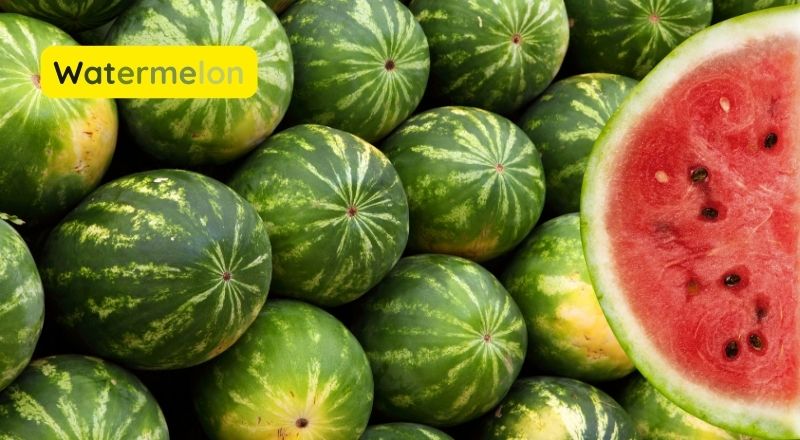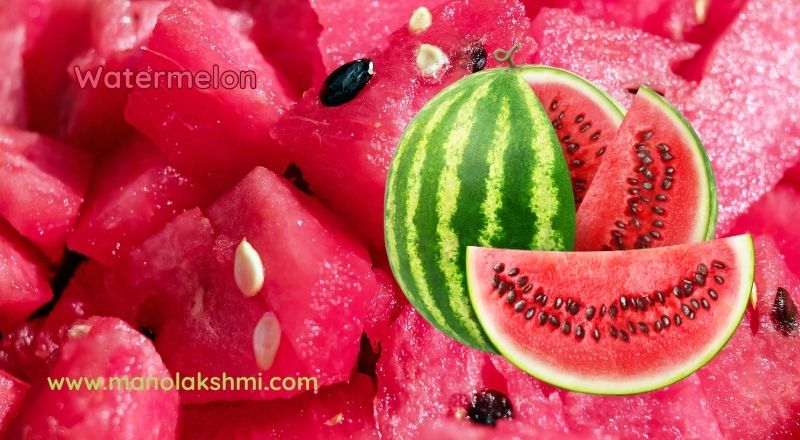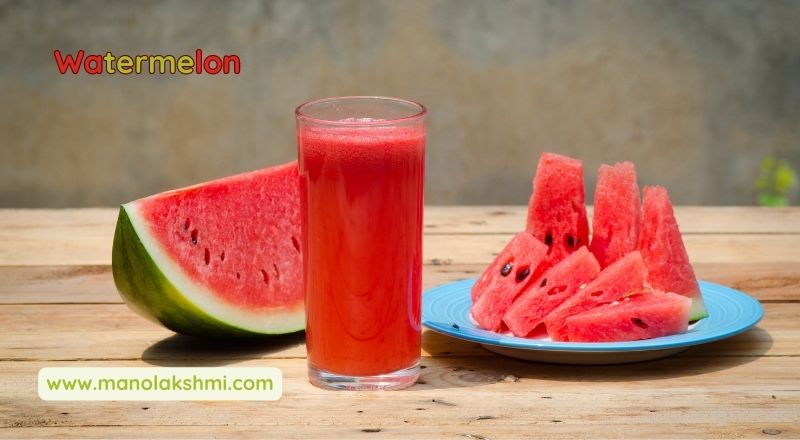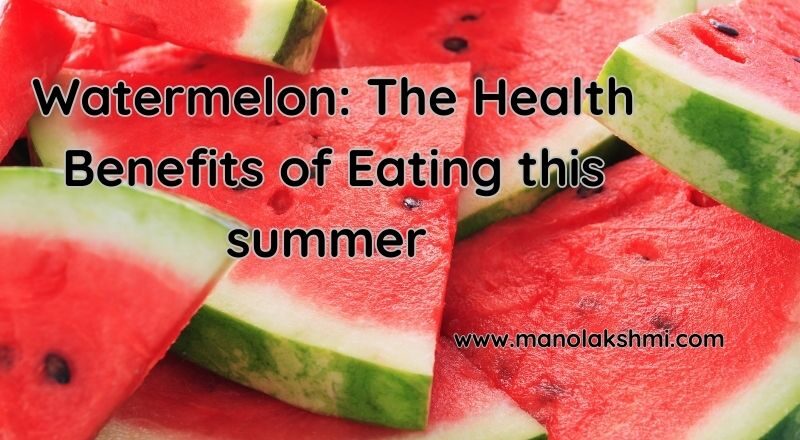What is a watermelon?
Watermelon is a delightful and invigorating fruit that is ideal for those scorching summer days. It is also a fantastic way to keep hydrated, as it is comprised of about 92% water. Furthermore, watermelon is low in calories and high in vitamins A and C, which makes it a nutritious snack alternative. When picking a watermelon, search for one that is symmetrical and free from bruises or soft spots. Slicing it into pieces or cubes will yield a delicious and wholesome snack.

Watermelon is a large, juicy fruit that is typically round or oblong in shape and has a smooth green rind with lighter green stripes. It is believed to have originated in Africa and is now grown in many parts of the world. The inside of a watermelon is typically pink or red and contains many small black seeds, although some seedless varieties are also available. Watermelons are popular summer snacks and versatile ingredients in salads and smoothies.
They are a good source of vitamin C and contain some other important nutrients, such as lycopene and potassium.
The world’s largest watermelon weighed more than 350 pounds.
Watermelons are in the cucumber family.
They are often associated with summertime and picnics.
Nutritional Value of Watermelon
Watermelon is a delicious and refreshing fruit that is not only tasty but also packed with numerous health benefits. This makes it an excellent fruit to consume during hot summer days to stay hydrated.

It is a rich source of vitamins A and C, which are essential for maintaining healthy skin and overall immunity.
Watermelon also contains lycopene, an antioxidant that has been shown to reduce the risk of certain types of cancer and improve heart health.
This fruit is low in calories and high in fibre, making it an ideal snack for those looking to lose weight or maintain a healthy weight.
Incorporating watermelon into your diet is an easy way to reap its nutritional benefits while enjoying its sweet and refreshing flavour.
Watermelon Health Benefits
Watermelon is a delicious and refreshing fruit that is also packed with nutrients. It provides vitamins A and C, as well as potassium and lycopene. Watermelon is also a good source of water, making it a great choice for people who are trying to stay hydrated.
Here are some of the health benefits of watermelon:
It includes vitamins A and C, both of which are necessary for optimum health.
It contains potassium, which is beneficial to heart health.
It’s a good source of lycopene, which is an antioxidant that has been linked with a reduced risk of cancer.
It’s a good source of water, which is important for hydration.
It is a low-calorie food that can help with weight loss.
It’s a refreshing and delicious fruit that can be enjoyed by people of all ages.
Watermelon is a healthy and delicious fruit that can be enjoyed as part of a balanced diet.
Health Production
Watermelon is a delicious and refreshing fruit that offers several natural benefits.
 Hydration: Watermelon’s over 92% water, making it an excellent source of hydration. Staying hydrated is important for maintaining healthy skin, digestion, and overall bodily function.
Hydration: Watermelon’s over 92% water, making it an excellent source of hydration. Staying hydrated is important for maintaining healthy skin, digestion, and overall bodily function.
Nutrient-rich: Watermelon is low in calories but rich in essential nutrients. It contains vitamins A, C, and B6, as well as potassium and lycopene, an antioxidant that gives it its red colour.
Hydrating electrolytes: Apart from its water content, watermelon also contains electrolytes like potassium and magnesium, which are vital for maintaining proper hydration and supporting various bodily functions.
Antioxidant properties: Watermelon contains antioxidants such as lycopene and vitamin C. Which help neutralise harmful free radicals in the body. Antioxidants offer potential health benefits, potentially reducing chronic disease risk.
Natural source of citrulline: Watermelon’s one of the few fruits that naturally contain an amino acid called citrulline. Citrulline converts into arginine, promoting heart health and maintaining healthy blood vessels.
Fibre content: Watermelons contain fibre, which aids in digestion and promotes healthy bowel movements.
Remember, while watermelon is a healthy fruit, it’s essential to consume it as part of a balanced diet and consult with a healthcare professional for personalised advice.
Skincare Benefits
Watermelon is not only a tasty summer treat, but it also has numerous skincare benefits that can help keep your skin healthy and glowing.
 Hydration: Watermelon’s made up of 92% water, which makes it an excellent natural hydrator for your skin. When you eat watermelon or apply it topically, it can help lock in moisture and keep your skin hydrated.
Hydration: Watermelon’s made up of 92% water, which makes it an excellent natural hydrator for your skin. When you eat watermelon or apply it topically, it can help lock in moisture and keep your skin hydrated.
Antioxidants: Watermelon is rich in antioxidants like vitamin C and lycopene. Which can help protect your skin from damage caused by free radicals. Free radicals can cause premature ageing, so including watermelon in your skincare routine can help keep your skin looking youthful.
Anti-inflammatory: Watermelon also contains anti-inflammatory compounds that can help soothe and calm irritated skin. This makes it a great ingredient for those with sensitive skin or conditions like rosacea.
Exfoliation: The natural acids found in watermelon can help gently exfoliate your skin, removing dead skin cells and revealing brighter, smoother skin. You can make a DIY watermelon face mask by blending watermelon with honey and applying it to your face for 15-20 minutes before rinsing off.
Watermelon is a delicious and beneficial addition to any skincare routine. Whether you eat it or apply it topically, your skin will thank you for the hydration, antioxidants, anti-inflammatory properties, and exfoliation benefits.
How to properly store watermelons?
Watermelons are a delicious fruit that is perfect for summertime snacks and desserts. Proper storage of watermelons is crucial to ensure that they stay fresh and tasty for as long as possible. Here are some tips on how to properly store watermelons:
Keep them at room temperature: whole watermelons should be stored at room temperature until they are cut open. This is because cold temperatures can cause the fruit to break down and lose its flavour.
Store them in a cool, dry place: Store watermelons in the refrigerator after slicing, and whole ones in a cool, dry spot away from direct sunlight.
Avoid stacking them: watermelons should be stored individually and not stacked on top of each other. This is because the weight of the top melon can cause damage to the bottom one.
Store them away from other fruits and vegetables: watermelons release ethylene gas, which can cause other fruits and vegetables to ripen too quickly. To avoid this, store watermelons away from other produce.
By following these tips, you can ensure that your watermelons stay fresh and delicious for as long as possible.
Visit and support our page: Kiwi Fruits: A Delicious and Healthy Snack for Weight Loss

I don’t think the title of your article matches the content lol. Just kidding, mainly because I had some doubts after reading the article. https://accounts.binance.com/tr/register?ref=W0BCQMF1